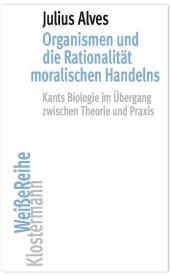 Neuerscheinungen 2019Stand: 2020-02-01 |
Schnellsuche
ISBN/Stichwort/Autor
|
Herderstraße 10
10625 Berlin
Tel.: 030 315 714 16
Fax 030 315 714 14
info@buchspektrum.de |

Julius Alves
Organismen und die Rationalität moralischen Handelns
Kants Biologie im Übergang zwischen Theorie und Praxis
2019. X, 444 S. 20 cm
Verlag/Jahr: KLOSTERMANN 2019
ISBN: 3-465-04408-8 (3465044088)
Neue ISBN: 978-3-465-04408-6 (9783465044086)
Preis und Lieferzeit: Bitte klicken
Passt der Mensch als moralischer Akteur in die Welt? Während in früheren Ansätzen Kants nur der aus den Bedürfnissen der Praxis gespeiste Glaube blieb, hofft er in der "Kritik der Urteilskraft" zeigen zu können, dass sich die Überzeugung von einer moralkompatiblen Welt unabhängig rechtfertigen lässt - aus Ästhetik und Biologie. Der Autor liefert zunächst eine systematische Analyse von Kants Problemstellung: Was motiviert die Suche nach einem solchen Übergang zwischen Theorie und Praxis und was kommt als Lösung infrage? Dann schlägt er eine innovative Lesart der Rolle der Biologie im Übergangsargument vor: Sie ist nicht als positiver Beitrag, sondern als naheliegender Einwand gegen das angestrebte Argument zu verstehen. Das wirft neues Licht insbesondere auf die Antinomie der teleologischen Urteilskraft.
Does man fit into the world as a moral actor? In Kant´s earlier approaches, only faith catering to the needs of human practice remained to supply an answer to this question. In the "Critique of Judgment", though, Kant attempts to show that the conviction concerning the existence of a morally compatible world can indeed be independently justified - namely from aesthetics and biology. The author first provides a systematic analysis of Kant´s problem: What motivates the search for such a transition between theory and practice and what can be considered a satisfactory solution? He then proposes an innovative reading of the role of biology in the transition argument: It is not to be understood as a positive contribution, but as an obvious objection to the argument pursued in the first place. This sheds new light in particular on the antinomy of teleological judgement.


